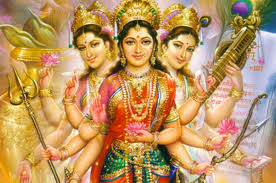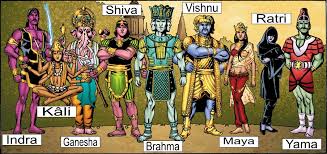 Fundamental to the life and thought of Indian from the very earliest times is the great mythological theme of atma-yajna—the act of “self-sacrifice” whereby God gives birth to the world, and whereby men, following the divine pattern, reintegrate themselves with God. The act by which the world is created is the same act by which it is consummated—the giving up of one’s life—as if the whole process of universe were the type of game in which it is necessary to pass on the ball as soon as it is received. Thus the basic myth of Hinduism is that the world is God playing hide-and-seek with himself. As Prajapati, Vishnu, or Brahma, the Lord under many names creates the world by an act of self-dismemberment or self-forgetting, whereby the One becomes Many, and the single Actor plays innumerable parts. In the end, he comes again to himself only to begin the play once more – One dying into Many, and Many dying into the One….By the act of self-abandonment God becomes all beings, yet at the same time does not cease to be God.
Fundamental to the life and thought of Indian from the very earliest times is the great mythological theme of atma-yajna—the act of “self-sacrifice” whereby God gives birth to the world, and whereby men, following the divine pattern, reintegrate themselves with God. The act by which the world is created is the same act by which it is consummated—the giving up of one’s life—as if the whole process of universe were the type of game in which it is necessary to pass on the ball as soon as it is received. Thus the basic myth of Hinduism is that the world is God playing hide-and-seek with himself. As Prajapati, Vishnu, or Brahma, the Lord under many names creates the world by an act of self-dismemberment or self-forgetting, whereby the One becomes Many, and the single Actor plays innumerable parts. In the end, he comes again to himself only to begin the play once more – One dying into Many, and Many dying into the One….By the act of self-abandonment God becomes all beings, yet at the same time does not cease to be God.
In the beginning this world was Atman (the Self), alone in the form of Purusha. Looking about he saw nothing other than himself. He said first, “I am.” Thence came the word “I.” then even now, when one is spoken to, he first answers simply, “It is I,” and then
On all sides That has hands and feet;
On all sides eyes, heads, and faces;
On all sides in the world it hears;
All things it embraces.
It is important to remember that this picture of the world as the play (lila) of God is mythological in form. If, at this stage, we were to translate it directly into philosophical statement it would be a crude type of pantheism, with which Hindu philosophy is generally and erroneously confused. Thus the idea of each man, each thing, as a part which the Purusha plays in the state of self-forgetting must not be confused with a logical or scientific statement of fact. The form of statement is poetic, not logical.
Hindu philosophy has not made mistake of imagining that one can make an informative, factual, and positive statement about the ultimate reality….Hindu mythology elaborates the theme of the divine play on a fabulous scale, embracing not only colossal concepts of time and space, but also the widest extremes of pleasure and pain, virtue and depravity….The dark side of life has its integral part in the game just as any drama must have its villain, to disrupt the status quo, and as the cards must be shuffled, thrown into chaos, in order that there may be a significant development of the play. For Hindu thought there is no Problem of Evil. The conventional, relative world is necessarily a world of opposites. Light is inconceivable apart from darkness; order is meaningless without disorder; and, likewise, up without down, sound without silence, pleasure without pain….since his creative activity, like that of Tao, is with the spontaneity proper to growth as distinct from deliberation proper to making.
According to the myth, the divine play goes on through endless cycles of time, through periods of manifestation and withdrawal of the worlds measured in units of kalpas, the kalpa being a span of 4,320,000,000 years. From the human standpoint such a conception presents a terrifying monotony, since it goes on aimlessly for ever and ever. But from the divine standpoint it has all the fascination of the repetitious games of children, which go on and on because time has been forgotten and has reduced itself to a single wondrous instant.
The foregoing myth is not the expression of a formal philosophy, but an experience or state of consciousness which is called moksha or “liberation.” On the whole it is safer that Indian philosophy is primarily this experience; it is only quite secondarily a system of ideas which attempt to translate the experience into conventional language. At root, then, the philosophy becomes intelligible only by sharing the experience which consists of the same type of nonconventional knowledge found in Taoism. It is also termed atma-jnana (self-knowledge) or atma-bodha (self-awakening), since it may be considered as the discovery of who or what I am, whom I am no longer identified with any role or conventional definition of the person. Indian philosophy does not describe the content of this discovery, except in mythological terms, using the phrase “I am Brahman” or “That are thou” to suggest that self-knowledge is a realization of one’s original identity with God.
But this does not imply what “claiming to be God” means in a Hebrew-Christian context, where mythical language is ordinarily confused with factual language so that there is no clear distinction between God as described in the terms of conventional thought and God as he is in reality. A Hindu does not say “I am Brahman” with the implication that he is personally in charge of the whole universe and informed as to every detail of its operation. On the one hand, he is not speaking of identity with God at the level of his superficial personality. On the other, his “God” – Brahman – is not in charge of the universe in a “personal” way; he does not know and act in the manner of a person since he does not know the universe in terms of conventional facts nor act upon it by means of deliberation, effort, and will. It may be of significance that the word “Brahman” is from the root brih, “to grow,” since his creative activity, like that of Tao, is with the spontaneity proper to growth as distinct from the deliberation from the making. Furthermore, though Brahman is said to “know” himself, this knowing is not a matter of information, a knowledge such as one has of objects distinct from a subject. In the words of Shankara,
For he is the knower, and the knower can know other things, but cannot make Himself the object of His own knowledge, in the same way that fire can burn other things, but cannot burn itself.
Source: “The Way of Zen”, By: Alan W. Watts
